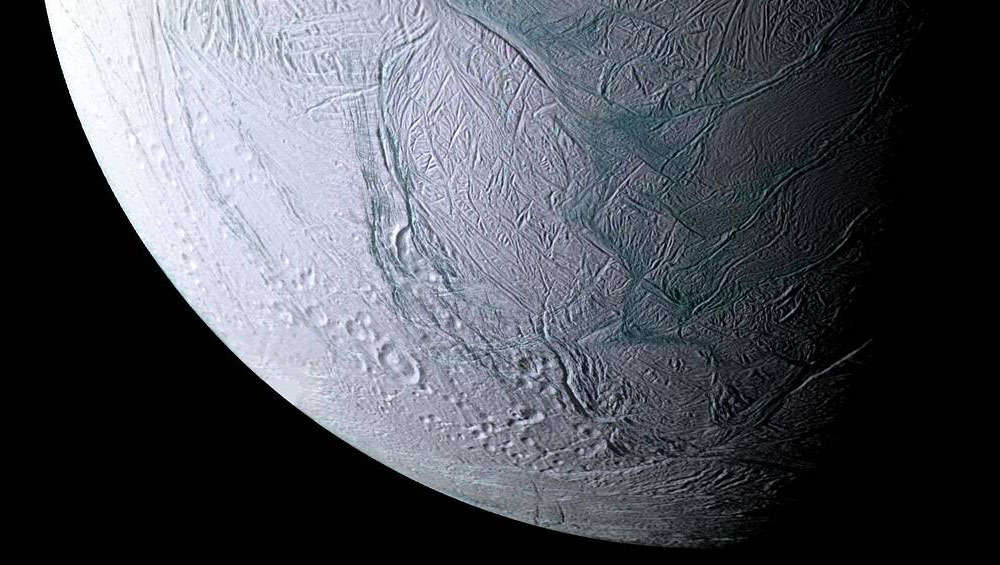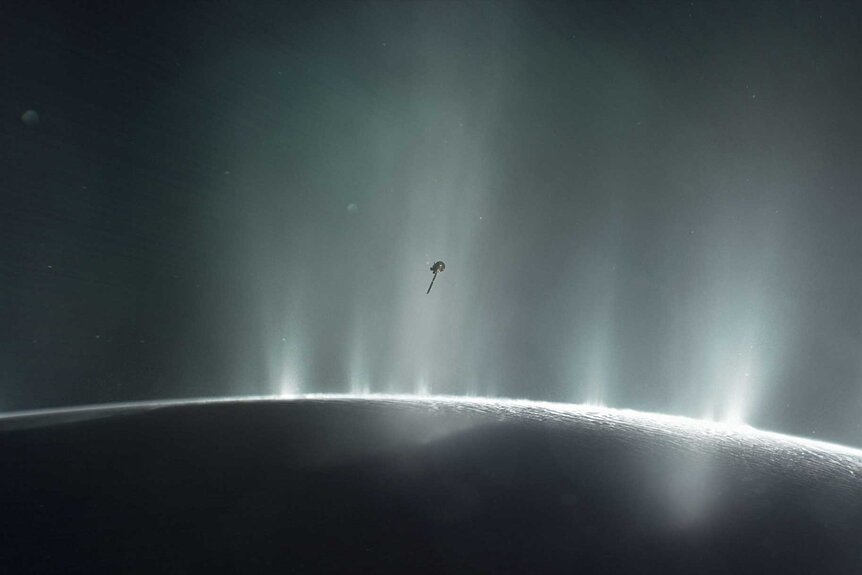Create a free profile to get unlimited access to exclusive videos, sweepstakes, and more!
Saturn’s Moon Enceladus Has All the Ingredients for Life
Time to get cooking!

In the 2013 sci-fi horror flick Europa Report (streaming now on Peacock), a private company called Europa Ventures sends a small crew of explorers on the first crewed mission to Jupiter’s moon Europa. It’s a point of interest in our solar system because astronomers are pretty certain it’s hiding a liquid water ocean beneath its frozen surface. Almost as soon as our fictional astronauts touch down on Europa’s surface, they encounter strange and violent alien life. They confirm that humans aren’t alone in the universe, but at the cost of their lives.
In the real world, we haven’t yet had the privilege of being eaten alive by extraterrestrial tentacled monsters, but a boy can dream. Our best shot, it turns out, might not be orbiting Jupiter, but Saturn instead. There, the icy moon of Enceladus, one of the largest of Saturn’s 100-plus satellites, has a subterranean ocean of its own, and it’s filled with every ingredient for life, according to a recent study published in the journal Nature.
Enceladus Might Be the Next Best Thing to Earth
The moon, pulled like taffy by the complicated gravitational tug of war inside the Saturnian system, heats up and forms an ocean beneath the ice. Every so often, the ice cracks and the moon belches dozens of gallons of water per second into space. We’ve known for a while that Enceladus has water hiding out beneath its frozen crust, but that’s only one ingredient (albeit an important one) in the chemical soup needed to create and sustain life. Now, researchers have found evidence of phosphates in the water blasting out of Enceladus, ticking the final box in the life ingredients checklist.
RELATED: JWST Reveals 6,000-Mile Water Plume Blasting From Enceladus
While water and an energy source are all but assured to exist on Enceladus, it wasn’t clear until now whether those alien oceans had everything they needed to be an efficient hub for life. Most of the ingredients like carbon, hydrogen, nitrogen, and oxygen have been previously confirmed, but phosphorus is the rarest of the bio-essential elements. If Enceladus was going to be missing anything, phosphorus was likely to be it.
Moreover, prior research has suggested that the availability of phosphorus in alien oceans is likely to be low, creating a potential bottleneck for the emergence of life elsewhere in the universe. The recent study, however, demonstrates that the opposite is true of Enceladus. Not only does Enceladus have phosphates in its oceans, it has concentrations roughly 1,000 times higher than the oceans on Earth. This marks the first time phosphorus has been detected in an ocean not on Earth.
Researchers confirmed the existence of phosphates using data from the Cassini orbiter. During its mission, it flew through Saturn’s E-ring, which is fed by the icy volcanism of Enceladus, and gathered ice crystal samples. As a result, sampling Saturn’s E-ring is tantamount to sampling the subsurface ocean itself. Scientists studied 345 ice grains from Enceladus and measured chemical weights consistent with the presence of phosphates.
RELATED: It’s about time we plan a mission to Uranus — and seek out aliens on Enceladus
The reason Enceladus has so much biologically available phosphorus might come down to the characteristics of its water. Based on previous analyses, the oceanic water on Enceladus is rich in carbonates, not dissimilar from carbonated water found in soft drinks on Earth. You can also find carbonate-rich water in soda lakes on our planet, making them good first order analogues for what might be going on beneath Enceladus’ surface.
On Earth, carbonated water in soda lakes more efficiently dissolves phosphates out of rock. If the same thing is happening on Enceladus, that could explain why there are so many phosphates where none were expected. It’s also good news for any upstart lifeforms who want to get a toehold in the universe’s more extreme locales.
We might just have to go to Enceladus and find out for ourselves. But first we should work on our anti-tentacle defense systems. Learn from the ill-fated adventures of Europa Report, streaming now on Peacock!



























